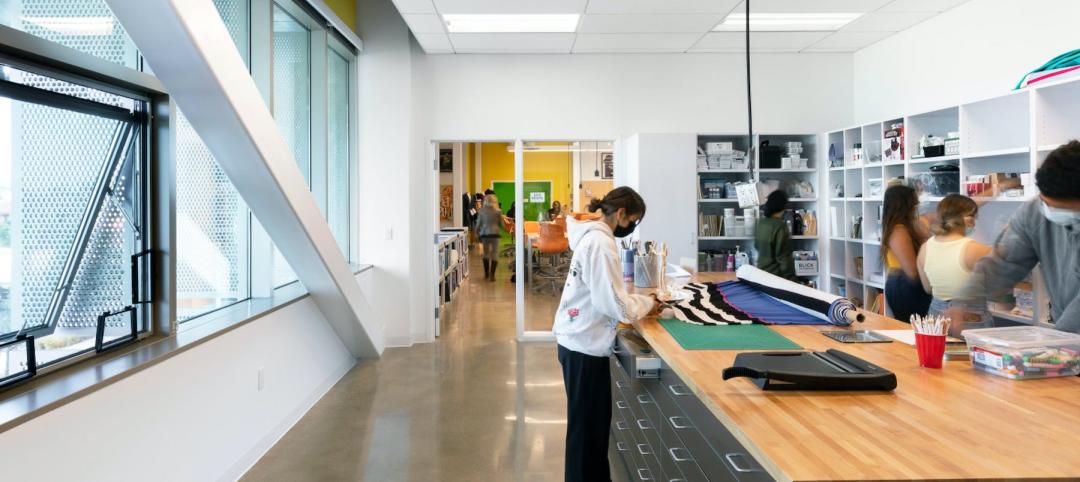The new Central Utility Plant (CUP) at Los Angeles International Airport (LAX) reached a major construction milestone when construction workers placed the final structural steel beam atop the building’s frame on January 24, 2012. Currently on schedule for construction completion in summer 2014, the $438 million (development cost) design-build project is being built by Clark/McCarthy, A Joint Venture.
In just four weeks, construction workers from Schuff Steel used a Manitowoc 999 Lattice-boom crawler crane with a reach of 140 feet to erect 1,400 tons of structural steel, creating the frame for the new CUP. An audience of approximately 300 project stakeholders and construction workers celebrated the ‘topping out’ during a ceremony held near the construction site. As a part of the event, attendees signed the final I-beam adorned with an American flag and an evergreen tree. The beam was then lifted 75 feet high and attached to the top of the structure. he tree represents growth, life and good luck for the construction workers and the building’s future occupants. The flag is displayed as a patriotic symbol that signifies the united effort by the project team to achieve a common goal.
The 70,000-square-foot facility has a steel frame that weighs in excess of 1,400 tons, or 40 pounds per square foot—about 30% higher than an OSHPD hospital in California.
The new CUP is being built to replace the existing 50-year old facility with a modern; state-of-the-art, computer managed utility plant providing enhanced passenger comfort and reliability of utility service and safety within the newly renovated modernized terminals at LAX. The existing CUP will service the airport throughout construction. Upon project completion, the replacement will be brought on-line and the old CUP will be decommissioned and demolished.
Serving as general contractor for the project, Clark/McCarthy’s contract includes demolition of the existing 50-year-old CUP as well as construction of a new 64,000-square-foot, steel-framed replacement CUP with a 20,000-ton cooling capacity. The project also entails the installation of associated equipment, such as a stand-by boiler, primary and secondary chilled water pumps, cooling towers, electrical systems and switchgear.
A new maintenance shop and offices and an above-grade thermal energy storage tank with capacity for 1.6 million gallons of water and 15,500 ton-hours of cooling is also being built. Other work includes: replacement of approximately 18 miles of pipe and duct bank that service the entire Central Terminal Area (CTA) with utility distribution, electrical and communications systems as well as reclaimed water, fire water and potable water systems; installation of several miles of new distribution piping throughout the CTA and beneath existing main entrance roadways throughout the airport; and an upgrade of pump rooms and air handling equipment in 21 different locations within all terminals, administrative buildings and the LAX Theme Building.
Systems and their components for the new CUP were designed and constructed to achieve LEED Silver certification from the U.S. Green Building Council.
Clark/McCarthy, A Joint Venture is a joint venture between Clark Construction Group and McCarthy Building Companies. Additional project partners include: Gruen Associates, Los Angeles, architect; Arup, Los Angeles, mechanical, electrical, plumbing, structural, and commissioning engineer; Capital Engineering Consultants, Rancho Cordova, Calif., mechanical consultant; Greenform, Los Angeles, sustainability consultant; and PID Engineering, San Diego, cogeneration consultant. BD+C
Related Stories
| Aug 11, 2022
Report examines supposed conflict between good design and effective cost management
A report by the American Institute of Architects and the Associated General Contractors of America takes a look at the supposed conflict between good design and effective cost management, and why it causes friction between architects and contractors.
Architects | Aug 11, 2022
Mancini Duffy Bill Mandara on expanding through diversification
In this segment for HorizonTV, BD+C's John Caulfield interviews Mancini Duffy's CEO and Co-owner William Mandara about his firm's recent growth, which includes an acquisition and new HQs office.
Energy Efficiency | Aug 11, 2022
Commercial Energy Efficiency: Finally “In-the-Money!”
By now, many business leaders are out in front of policymakers on prioritizing the energy transition.
High-rise Construction | Aug 11, 2022
Saudi Arabia unveils plans for a one-building city stretching over 100 miles long
Saudi Arabia recently announced plans for an ambitious urban project called The Line—a one-building city in the desert that will stretch 170 kilometers (106 miles) long and only 200 meters (656 feet) wide.
| Aug 10, 2022
U.S. needs more than four million new apartments by 2035
Roughly 4.3 million new apartments will be necessary by 2035 to meet rising demand, according to research from the National Multifamily Housing Council (NMHC) and National Apartment Association.
| Aug 10, 2022
Gresham Smith Founder, Batey M. Gresham Jr., passes at Age 88
It is with deep sadness that Gresham Smith announces the passing of Batey M. Gresham Jr., AIA—one of the firm’s founders.
| Aug 9, 2022
Work-from-home trend could result in $500 billion of lost value in office real estate
Researchers find major changes in lease revenues, office occupancy, lease renewal rates.
| Aug 9, 2022
5 Lean principles of design-build
Simply put, lean is the practice of creating more value with fewer resources.
| Aug 9, 2022
Designing healthy learning environments
Studies confirm healthy environments can improve learning outcomes and student success.
Legislation | Aug 8, 2022
Inflation Reduction Act includes over $5 billion for low carbon procurement
The Inflation Reduction Act of 2022, recently passed by the U.S. Senate, sets aside over $5 billion for low carbon procurement in the built environment.

















